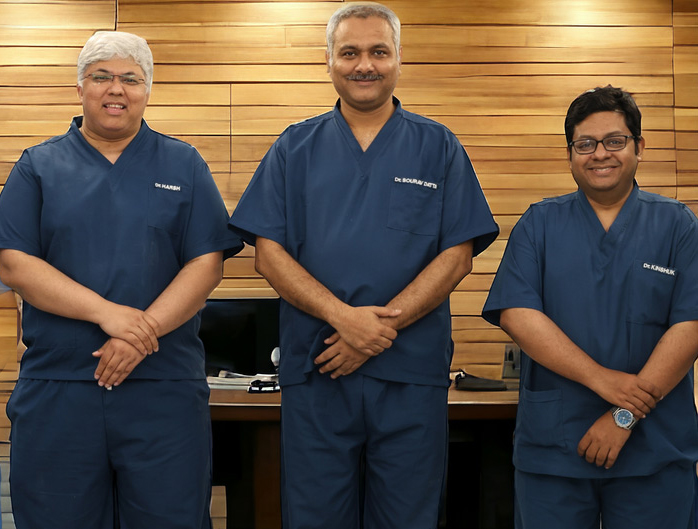About Clinic
Welcome to the clinic, where excellence in oncology care meets compassionate patient support. Our clinic is the culmination of the expertise and dedication of four leading head and neck oncology specialists, united in a shared commitment to providing unparalleled care to our patients.
At the clinic we understand the complexities and challenges that come with a diagnosis of head and neck cancer. That’s why our team is composed of highly skilled doctors who are not only experts in their field but also compassionate caregivers. With years of experience and a focus on cutting-edge treatments, we strive to offer personalized care tailored to the unique need of each patient.

Our approach to oncology care goes beyond medical expertise. We believe in a holistic approach that addresses the physical, emotional, and psychological aspects of cancer treatment. From the moment you walk through our doors, you will be greeted by a supportive team dedicated to guiding you through every step of your journey.
What sets us apart is our collaborative approach to patient care. As a team of four head and neck oncology specialists, we regularly collaborate on cases, ensuring that our patients benefit from the collective knowledge and experience of the entire team. This multidisciplinary approach allows us to develop comprehensive treatment plans that prioritize both efficacy and quality of life.
At the clinic, we are committed to staying at the forefront of oncology research and innovation. We continually invest in the latest technologies and treatment modalities to ensure that our patients have access to the best possible care.
Whether you are seeking a second opinion, exploring treatment options, or in need of ongoing care, we are here for you every step of the way. Your journey towards healing begins here at the clinic.
Contact us today to schedule a consultation and experience the Clinic difference.
What is Head and Neck Cancer?
Head and neck cancer refers to a group of cancers that develop in the tissues of the head and neck region. This includes cancers arising in the oral cavity (mouth), throat (pharynx), voice box (larynx), salivary glands, nasal cavity and paranasal sinuses, thyroid gland, the ears, and the skin of the face, neck and scalp. These cancers can affect various structures and organs involved in the vital functions of breathing, speaking, swallowing, and other essential functions.
Here are some key points about head and neck cancers :
Types
Head and neck cancer encompasses a wide range of cancer types, including squamous cell carcinoma (the most common type), adenocarcinoma, adenoid cystic carcinoma, mucoepidermoid carcinoma, sarcoma, lymphoma, and melanoma, amongst others. The type of cancer depends on the specific tissues or organs affected.
Risk Factors
Several factors increase the risk of developing head and neck cancer, including tobacco use (smoking or chewing), heavy alcohol consumption, human papillomavirus (HPV) infection, chronic exposure to certain chemicals or toxins (such as those found in the workplace), poor orodental hygiene, chronic irritation or inflammation (such as from ill-fitting artificial dentures or sharp teeth and persistent throat infections), and a diet lacking in fruits and vegetables.
Symptoms
Symptoms of head and neck cancer can vary depending on the location and the stage of the cancer at presentation but, in general, may include a persistent sore throat, difficulty or pain in swallowing (dysphagia/odynophagia), a lump or mass in the neck, change in voice (hoarseness), persistent ear pain, unexplained weight loss, a sore or an ulcer in the mouth that doesn't heal on its own in 2 weeks of time, and swelling or pain in the face or neck.
Diagnosis
Diagnosis typically involves a combination of physical examination, imaging tests (such as CT scans, MRI scans, or PETCT scans), endoscopy (using a flexible or rigid scope to visualize the inside of the throat and airway), and biopsy to examine tissue samples under a microscope. Early detection is the key to successful treatment.
Treatment
Treatment for head and neck cancer depends on factors such as the type of cancer, the stage of the disease, and location of the cancer, as well as the patient's overall health and preferences. Treatment options may include surgery, radiation therapy, chemotherapy, targeted therapy, immunotherapy, or a combination of these approaches.
Rehabilitation and Support
Treatment for head and neck cancer can impact functions such as swallowing, speaking, breathing, and eating. Hence, rehabilitation and supportive care, including speech and swallowing therapy, nutritional support, psychological support, and assistance with coping strategies, are important aspects of a comprehensive care for patients with head and neck cancer.
